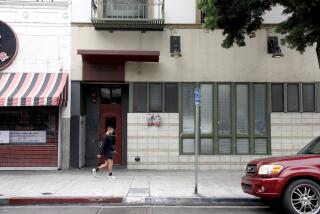5 Years in the Courts : A $290,000 Check Brings Family Closer to Own Home
- Share via
First came the dream: Celestino and Rosario Gonzalez entered an escrow to buy their first home.
Then came the nightmare: The home was sold to someone else and when the couple looked for another house, prices had risen beyond their reach.
But today they are again dreaming of their first home. They’ve won a five-year legal battle over their attempted purchase and have a check for $290,000 from the Los Angeles real estate investor who reneged on the deal with the Gonzalezes when he found a higher bidder.
William Little, who testified in 1982 that he owned $17 million worth of property, backed out of an agreement to sell a La Puente house to the Gonzalez family for $53,000 after he found a second buyer willing to pay $55,000, according to court testimony.
The transactions occurred five years ago when housing prices were escalating rapidly. The Gonzalezes, who had saved $5,000 for a down payment, qualified financially when they offered to buy the house in December, 1979, but five months later, when they learned the house was being sold to someone else, they looked for another house and were unable to find one they could afford, Gonzalez testified.
Ordered to Pay
A Norwalk Superior Court jury in 1982 ordered Little to pay the Gonzalezes $30,000 for fraud and $200,000 in punitive damages. Little appealed, but the state Court of Appeal upheld the verdict in January. Little asked the state Supreme Court to hear the case, but it refused earlier this month.
Finally, last week a check arrived for slightly more than $290,000, representing the damage award, plus interest.
Coincidentally, it came about three weeks after the Gonzalezes received a notice to vacate the small two-bedroom La Habra apartment where they have lived for 11 years. Their landlord sold the apartment and the family must move next month.
Although it took five years, the court case broke no legal ground, attorneys for both sides agreed.
Indeed, Mitchel Ezer, who represented Little in the appeals but not in the Superior Court trial, conceded in his appellant briefs that evidence supported the trial verdict. The dispute was over the amount of money awarded, with Ezer arguing that damage done to the Gonzalezes had been exaggerated and that their attorney inflamed the jury by dwelling on her clients’ poverty and Little’s wealth. He said the Gonzalezes were portrayed as “the Little Match Girl and Tiny Tim.”
Poor Versus Rich
It was a case of the poor versus the rich. So much so, in fact, that Gonzalez said friends told him he was foolish to take Little to court: “They said, ‘Forget it. He’s a rich man; you’re a poor man. You’ll never win.”’
Little, who is in his early 40s, came to Los Angeles from Canada in 1966 and, according to his court testimony, began to buy real estate in 1972, often in low-income areas and out of foreclosure. He testified that in 10 years, he amassed 351 properties worth $17 million, netting him income of $88,000 a month.
Celestino Gonzalez, 38, came to Southern California from Durango, Mexico, in 1969 and got a job washing dishes. He was able to bring his wife, Rosario, here to join him in 1974, and since then they have lived in La Habra. They have a 15-year-old daughter and a 9-year-old son.
Gonzalez has worked steadily for a restaurant chain, where he now is a meat cutter, but the family has struggled financially.
his
Underwent Heart Surgery
Rosario Gonzalez underwent heart surgery in 1976. After paying off medical bills, the family saved for 2 1/2 to accumulate $5,000 for the down payment on a house.
In December, 1979, they offered to pay the full asking price of $53,000 on a 940-square-foot home in the low-income “Happy Homes” housing tract in La Puente. It was not the ideal home or neighborhood, Gonzalez said, but it was what they could afford. Little, who had acquired the house in foreclosure in 1976, accepted the offer.
But Little also accepted an offer from another buyer for $55,000 the next day, court records said. Neither buyer knew about the other and Little opened two escrows on the same property.
Ezer said Little made an honest mistake. Both buyers were, coincidentally, named Gonzalez, Ezer said, and it was only after both escrows were opened that Little became aware that his real estate agent had been talking about two different offers.
Ezer said Little should have explained the situation to both buyers, but chose instead to try to get out of one deal or the other.
Something Was ‘Wrong’
Gonzalez said he was planning to move into the house in two weeks when his real estate broker told him there was “something wrong” with the deal and he should consult a lawyer.
Trudy Polsky, a Los Alamitos attorney, said that when she took the case “it seemed like a simple breach of contract” that could be remedied with negotiation. The Gonzalezes offered to match the second offer, $55,000, Polsky said, and Little agreed to accept it, but backed out after the real estate broker for the second buyer insisted on payment of a $1,600 commission whether that sale went through or not. Little completed the sale to the second buyer in May, 1980.
The Gonzalezes sued Little and his real estate broker, winning a $2,000 judgment against the broker. They also collected $12,000 from a title company that mistakenly cleared the sale to the second buyer while the property was in litigation.
Polsky said most of the $12,000 from the title company was consumed by legal costs in the fight against Little and some of the $290,000 from Little is owed to her for legal expenses, too, but the Gonzalezes still will “have plenty of money to buy a house.”
Showed ‘Great Courage’
Polsky said the Gonzalezes showed “great courage” in refusing to settle the case for meager amounts offered by Little and in insisting on pressing ahead for adequate compensation. She said Little “counted on them giving up and settling cheap.”
Just before the Superior Court trial, Little offered $38,000 to settle, Polsky said, but that would not have been enough to put the Gonzalezes into a house. Celestino Gonzalez said he was willing to take $45,000, but $38,000 wasn’t enough. He said he figured “we get the house or we get nothing. We got the house.”
After the Superior Court decision, it was 2 1/2 years before the case went through appeal, and Gonzalez said he was worried that the case might be lost somehow.
Ezer argued in his appeal brief that Polsky had inflamed the jury by contrasting the plaintiff’s poverty with the defendant’s wealth, introduced inadmissible material about a rent control violation by Little, improperly elicited testimony from Little that he was being sued for fraud in 30 other cases and used body language, including “extraordinary facial grimaces,” to indicate disbelief in Little’s testimony.
Ezer said Polsky turned the trial into a circus, by, among other things, calling Little “a slumlord.” Actually, Little buys run-down properties and rehabilitates them, Ezer said. “He’s the antithesis of a slumlord.”
Jury Upheld on Appeal
In January, a three-judge appeals panel issued a 24-page decision that upheld the Superior Court verdict, exonerated Polsky of many of the misconduct charges and dismissed the remainder because Little’s lawyer at the trial had failed to make the proper objections. Ezer then carried the case to the state Supreme Court and asked it to consider the misconduct issues anyway since Little’s attorney at the trial was a “bumbling incompetent” and should have raised the objections.
The Supreme Court’s refusal to hear the case let stand an appellate decision that sympathized with the plight of the Gonzalez family while lambasting Little.
The appellate decision, written by Los Angeles Superior Court Judge Paul G. Breckenridge, who was sitting temporarily on the appeals panel, said the Gonzalezes were “typical Americans (who) had a dream to own their own home. They were relatively poor, but had worked hard, scrimped and saved. . . . They were deprived of their dream house by the fraud and deceit of the defendant.”
The court noted that Little said during the trial that he had so many deals going that he did not realize he had sold the same property twice and, therefore, was unaware of any deception. The court said Little’s testimony showed him to be “a very sophisticated businessman with a calculating mind, and with a very keen awareness of the details of his business interests when it was in his interest to remember such.”
‘Acted Maliciously’
The court said the plaintiffs proved Little “acted maliciously, with a conscious disregard for their rights” and that any jury would return the same verdict.
Little could not be reached for comment.
Polsky said the case took so long to resolve that she was afraid the Gonzalez children were going to grow up before the family got a house.
The day the check arrived Gonzales said he began looking for a house. He and his family want to remain in La Habra, he said, and they think they will find a better house than the one they tried to buy five years ago.
“Before, we had to buy anything we can,” he said. “Now, we can buy something we like. I think I’ve got enough money to buy whatever we like.”
More to Read
Sign up for Essential California
The most important California stories and recommendations in your inbox every morning.
You may occasionally receive promotional content from the Los Angeles Times.






